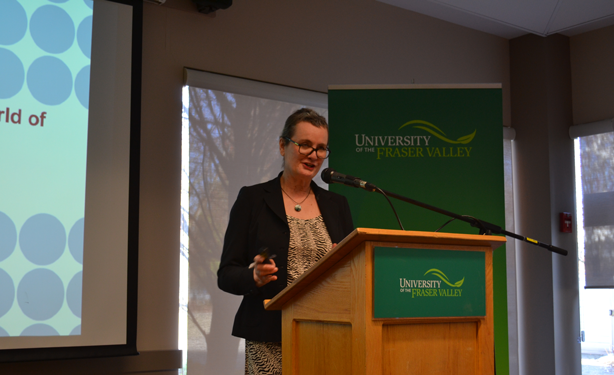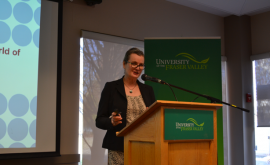Print Edition: April 9, 2014

Science Media Centre executive director and honorary doctorate holder Penny Park spoke at UFV as part of the President’s Leadership Lecture Series on April 1.
Park has a background in both the arts and sciences, and has made it her mission to improve scientific communication in journalism and enhance science awareness. She earned a bachelor of arts in linguistics at the University of New Brunswick, where she gained experience working at the university’s radio station, and later a bachelor of science in honours biology from the University of Guelph.
Park worked as the producer and senior producer on Quirks & Quarks from 1980 to 1995, and then joined the Discovery Channel, helping develop the popular documentary Daily Planet.
Park gave her lecture on improving science-journalism communication, but shared her ideas with The Cascade first. Later in the evening, she and other members of faculty joined Mark Evered at the Friesen House for a presidential dinner, which was catered by executive chef and owner Jeff Massey of Restaurant 62.
You have a wide range of interests. You have a degree in linguistics and a degree in biology as well. Tell me a little about how you got to where you are now.
When I left high school I really wanted to be a journalist. I wanted to be a correspondent, and … to start [was] with a BA at that time — you didn’t really have to go to journalism school. But I did start with campus radio, which I love and I think it’s a great place to spread your wings and really learn about what works and what doesn’t work in radio.
After [broadcasting] a couple of years of political current affairs, I said, “Oh my gosh, this is the most boring thing on the planet.” You know, politicians know what they want to say, and they keep saying the same thing over and over again, it seemed to me, and I didn’t have the skills to break it down, to get behind that message track.
So I said, you know maybe this isn’t really for me, maybe I’ll go back to school. So, I went back and did a science degree. And once I got the science degree the only other thing I knew how to do besides going to school was being in radio. That’s how I started working at Quirks and Quarks.
And now you’re at the Science Media Centre as their executive director. What are your goals in the SMC?
A small group of us got together to put together the Science Media Centre of Canada, which is a non-profit group that’s been set up to help journalists cover science. And I could see, increasingly today, journalists are under the gun. There was a study that came out, from the University of Wales, done by Nick Davies … [They] found that today reporters are required to pump out three times the amount of information and stories that they had to 30 years ago. It’s fast, fast, fast, and they also have to provide content across several different platforms.
Today, journalists are running faster, and there are fewer science journalists in this country. They have less of a background in science, and yet the issues that we face in this country increasingly have science at their core.
That’s where we thought [SMC] could come in and help by [putting] journalists together with evidence-based research and researchers quickly on their timeline.
I find that’s a common thread especially here at university: we’re geared toward one direction or the other. We are made to choose between the arts and science. What would you suggest to remedy this in journalism?
What I think is that there are qualities that journalists have — journalism should be taught to everybody. We know that people learn best with stories. Increasingly today you have that potential to tell your story in your own words directly to the public.
And that public can be policy makers as well, so you can have a concrete impact on your community, and your politicians, by things like social media, Facebook, Twitter, blogging. So there are all sorts of ways that you can do your own form of journalism.
I would like to say that journalism isn’t just writing. It is critical thought. It is verification. There are all sorts of values that journalism has that, I think, we as the public need to incorporate. Verification, transparency — those are the sorts of things that will help us evaluate the information that comes our way, and allow us to be better citizens.
Do you think journalists with arts-only backgrounds is a new trend?
No. I think that there have always been [journalists] who had science backgrounds, but not so many. I mean, just generally, there aren’t as many people in science or who know science, and the value for journalists to have some science means they can evaluate a study, that they have basic numeracy. So, they can again look at something they might be reading, and say, “Does that make sense? This is a study done on only 20 people. Should I be paying attention to that?”


